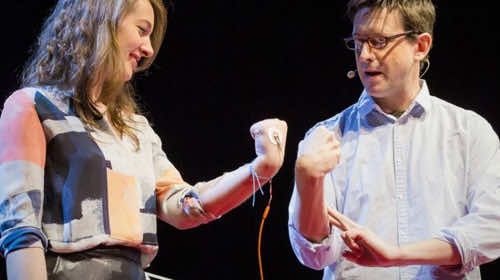The brain is the most mysterious and beautiful part of the human body. Despite the continuous medical advancement, little is known about the functionality of the elusive head organ, let alone reciprocating it on an artificial level. Some parts of the brain that we do understand are related to motor control functions. Using this, we have been able to control artificial limbs, hands and even other organs. In a strange experiment, this neuroscientist and biomedical engineer named Greg Gage attempted to control someone else’s hand with his own brain signals!
During his TED Ex presentation in Vancouver, Canada, Greg explained the complex nature of the neurons and their networks in the brain. He believes that the teaching of neuro systems should be extensively done from high schools so that people get basic understanding of brain functions from a very young age. He presented a device named SpikerBox, a non-invasive gadget to teach basic manners of neuron impulses from our brains. He has even found his own company named Backyard Brains that develops interesting brainy apparels for the amusement and learning of high school children. SpikerBox is the first of many creations he has made.
During his TED Ex presentation, he demonstrated the use of a system he made himself. He had electrodes to convert the brain data into signals, and they are interpreted by a computer. There are two volunteers involved that are connected via this interface. The controlling person uses his brainwaves to control the movement of his partner’s arm. But how was it possible without surgery? It is because the nerves are close the skin and signals can be interpreted by them from the outside. Thus, this device can be used with children as subjects that can be kind of cool both to look at and experience wise. Self-adhesive pads are used to stick the electrodes and other equipment to the volunteer’s body.
He also said that over 20% of the population is going to suffer from neurological diseases one way or another. It means that more research is needed on this front than other ones that don’t have this degree of affectees. With his new toys, he hopes to generate much-needed interest in the field and help people excel in this area.
See this video for better detail:



